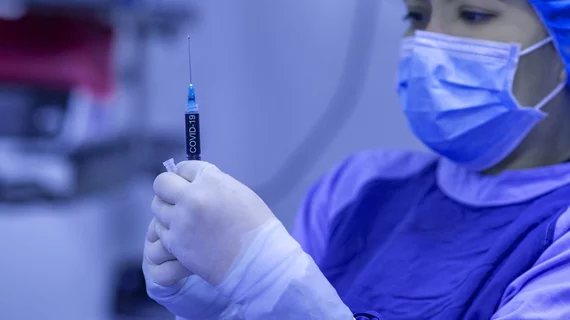CDC shares a new warning for healthcare workers receiving a COVID-19 vaccine
Healthcare workers should pay close attention to any symptoms they experience after receiving a COVID-19 vaccine, according to a new analysis from the CDC. Those symptoms might appear at first to be normal side effects of the vaccine—but they could also be signs that the individual now has COVID-19.
The study focused on employees at Israel’s Sheba Medical Center, one of the most well-known hospitals in the entire world. Healthcare workers were prioritized for immunization in Israel, the authors noted, and more than 4,000 staff members received the first dose of the BNT162b2 vaccine in December 2020.
Sheba Medical Center used daily health questionnaires, hotlines and other resources to track the health of vaccinated employees. Overall, 22 (0.54%) of those initial healthcare workers who were vaccinated later had a confirmed diagnosis of COVID-19. The average age of those individuals was approximately 45 years old, and there was no obvious connection between them.
Of those 22 healthcare workers, 13 had such symptoms as fever, chills, cough, headache or a sore throat. Two other workers were tested because they were exposed to someone with confirmed or suspected COVID-19. Asymptomatic cases, on the other hand, “were identified among healthcare workers as part of post-exposure screening.”
The researchers were able to identify 10 different “healthcare-related secondary exposures,” but nothing could be tied to the hospital’s immunization process. The team also noted that, among healthcare workers who reported experiencing COVID-19 symptoms, the median time between receiving the first dose of the vaccine and symptom onset was 3.5 days.
(One healthcare worker, it turns out, did experience some symptoms before immunization—they were excluded from the final analysis.)
“COVID-19 in healthcare workers is a major concern for health authorities worldwide,” wrote first author Sharon Amit, MD, PhD, an infectious disease specialist and clinical microbiologist at Sheba Medical Center, and colleagues. “Healthcare workers, especially acute and chronic care facility personnel, are at high risk for contracting symptomatic and asymptomatic COVID-19 and might become infected at home or nosocomially while caring for patients or interacting with other staff members. Infections among healthcare workers have an immediate effect on their close occupational environment and the overall healthcare system.”
The researchers also emphasized that healthcare workers can’t dismiss potential COVID-19 symptoms as being related to the vaccine “until true infection is ruled out and vaccines are tested.”
The CDC analysis can be read here. This is an “early release” version of the story, and final changes may still be made.

